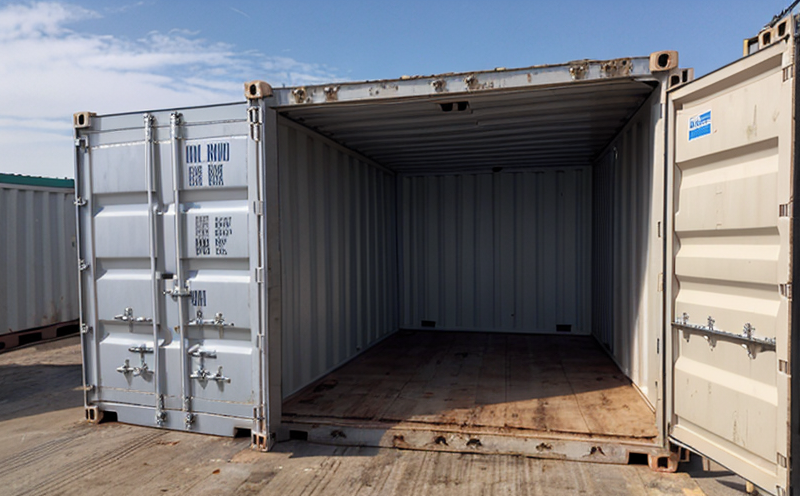Cargo container inspection
The inspection of cargo containers is a critical process in ensuring the integrity and compliance with international standards of goods transported by sea. This service plays an essential role in safeguarding against potential risks such as structural defects, hazardous materials, and counterfeit products. Quality managers and compliance officers rely on this service to maintain high standards of safety and efficiency within their supply chains.
Cargo container inspection encompasses a range of activities aimed at verifying the physical condition of the containers as well as ensuring that they meet regulatory requirements. This process is particularly important in sectors such as transportation, logistics, and manufacturing where goods are frequently shipped internationally. The service typically involves detailed checks on the exterior and interior of the container to identify any signs of damage or contamination.
The inspection also includes the verification of labeling and documentation associated with the shipment. Compliance officers ensure that all necessary paperwork is in order, including manifests, customs declarations, and any other relevant documents. This helps to prevent delays at border crossings and ensures smooth compliance with international regulations.
R&D engineers involved in developing new packaging solutions or optimizing logistics processes can benefit from this service by gaining insights into the environmental factors affecting container integrity during transport. Procurement teams use cargo container inspection results to make informed decisions about supplier reliability and quality control measures.
A key aspect of cargo container inspection is understanding the standards that govern these checks. For instance, ISO 16872:2019 outlines requirements for the design, construction, marking, and loading of containers used in international maritime transport. ASTM D4537-11 specifies test methods for determining the tensile strength of polyethylene plastic film, which might be relevant if you're inspecting containers made from such materials.
By adhering to these standards, laboratories performing cargo container inspections ensure that their findings are credible and universally acceptable across different regions. This consistency in methodology is crucial given the global nature of trade operations involving containers.
| Aspect | Description |
|---|---|
| Visual Inspection | Checking for visible signs of damage or wear on the exterior and interior surfaces of the container. |
| Weighing | Determining the weight of the container to check if it matches the expected value according to documentation. |
| Pressure Testing | Subjecting the container to controlled pressure to assess its structural integrity under simulated transportation conditions. |
The above table provides a snapshot of some common aspects covered during cargo container inspections. Each step is crucial in maintaining high standards that meet both local and international requirements.
- Visual Inspection: Ensures immediate assessment of visible damage or wear on the container.
- Weighing: Provides data on whether the container adheres to specified weight limits as per documentation.
- Pressure Testing: Validates the structural integrity by simulating real-world transport scenarios.
These methods form the backbone of a thorough cargo container inspection, providing reliable data that supports informed decision-making processes within organizations involved in global supply chains. Understanding these procedures is vital for those responsible for overseeing transportation and logistics operations to ensure they are meeting all necessary regulatory requirements while minimizing risks associated with improper handling or transport conditions.
Scope and Methodology
| Aspect | Description |
|---|---|
| Data Collection | Involves gathering information from various sources including previous inspection reports, manufacturer specifications, and current condition observations. |
| Analytical Techniques | Utilizes advanced tools like X-ray fluorescence spectrometry (XRF) for elemental analysis of materials used in construction. |
| Sampling Strategy | Pulls samples from multiple locations within the container to ensure comprehensive coverage of all areas. |
| Aspect | Description |
|---|---|
| Environmental Factors | Considers temperature, humidity, and other environmental conditions that could impact the container's performance. |
| Hazardous Materials Detection | Uses specialized equipment to identify any presence of dangerous substances within or around the container. |
| Labeling Compliance | Verifies that all required labels are present and correctly formatted according to international standards. |
The scope and methodology for cargo container inspection are comprehensive, covering various aspects from data collection to environmental considerations. By following these steps, laboratories can provide accurate assessments of the condition and compliance status of containers used in transportation and logistics operations.
One of the primary goals of this service is to identify any potential issues early on so that corrective actions can be taken before they escalate into more serious problems. This proactive approach helps maintain high standards of quality and safety throughout the supply chain, reducing risks associated with improper handling or transport conditions.
Eurolab Advantages
Cargo container inspection services offered by Eurolab offer several advantages that set us apart from competitors. Our experienced team of professionals brings a wealth of knowledge and expertise in this field, allowing us to provide accurate and reliable assessments.
- Comprehensive Coverage: We cover all aspects of cargo container inspections, ensuring no detail is overlooked.
- State-of-the-Art Equipment: Utilizing advanced tools like X-ray fluorescence spectrometry (XRF) ensures precise measurements and analysis.
- Prompt Reporting: Our turnaround times are fast, allowing for immediate feedback on the inspection results.
- Global Recognition: Eurolab's certifications and accreditations ensure that our services meet international standards and are widely accepted across different regions.
In addition to these technical advantages, Eurolab also emphasizes customer service excellence. We work closely with clients to understand their specific needs and provide tailored solutions. Our flexible approach allows us to adapt to changing market requirements while maintaining the highest levels of quality and efficiency.
By choosing Eurolab for your cargo container inspection needs, you can rest assured that you're receiving top-notch services from a reputable laboratory in the industry. Contact us today to learn more about how we can assist you with your transportation and logistics operations.





